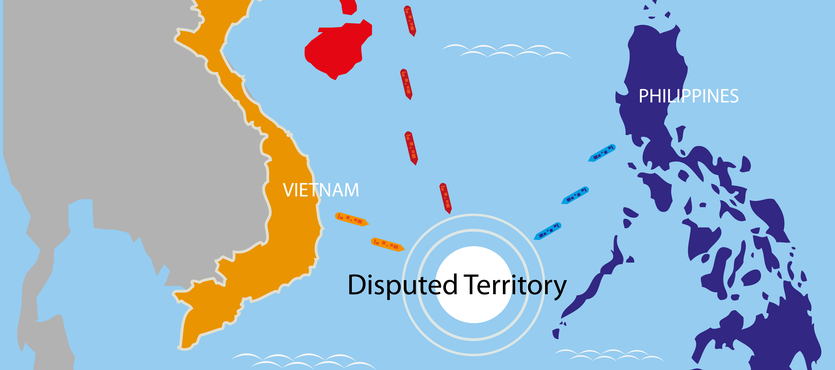Private military contractors, specifically BAE and Dyncorp, may see a significant uptick in business after Acting Defense Secretary Patrick Shanahan said he would use a new “toolkit of coercion” to keep China in check.
Former Defense Secretary Jim Mattis cited “policy differences” with Trump when he left the White House. Many speculate that these differences include military privatization. The stated goal of the Project 2049 Initiative is to enable Taiwan to better stand up to Chinese threats. Not coincidentally, 2049 is also the year that China has supposedly targeted for its rise to world-class military power status.
In May 2019, U.S. National Security Advisor John Bolton met with Taiwan’s national security chief David Lee. Their meeting was the first high-level security exchange between the U.S. and Taiwan since the 1980s.
The Two Chinas
Most people know that the Cold War divided Korea, Vietnam, and Germany. But it also divided China, albeit in a more one-sided way.
In 1949, nationalist leader Chiang Kai-shek finally lost a decades-long civil war with Communist leader Mao Tse-tung. Chaing’s Kuomintang relocated to Taiwan, where it declared martial law and exercised one-party rule. In 1951, Mao cleared the remaining KMT strongholds in Tibet and some other areas of mainland China.
In the mid-1980s, Chiang’s son, Chiang Ching-kuo, instituted a number of democratic reforms. The younger Chiang ended martial law and sanctioned the formation of the DPP. The Democratic Progressive Party was the first KMT opposition political party. The beginning of democracy also ushered in the beginning of the Taiwan independence movement. Previously, the only policy goal was Chinese reunification under Nationalist rule. In 1996, Chiang Ching-kuo’s vice-president, Taiwanese native Lee Teng-hui, became the country’s first democratically-elected president.
While Taiwan has become more independent and less obsessed with reunification, the same is not true in the People’s Republic of China, or mainland China, which considers Taiwan a rogue province. As recently as June 2019, the Chinese government declared that “If anyone dares to split Taiwan from China, the Chinese military has no choice but to fight at all costs.”
When China and Taiwan split, the United States backed Taiwan in the context of the Korean War. Then as now, North Korea was a key Chinese ally. Today, the United States is making the same play, but in the context of Chinese aggression. The latest regional hotspot is not the Korean Peninsula or the Taiwan Strait, but the nearby South China Sea, which is a critical part of the international oil trade. China and several other nations all have territorial claims in this region.
The Role of Contractors in Taiwan
Generally when American contractors go into overseas countries, they shore up U.S. interests in a place where U.S. forces are, for one reason or another, not exactly welcome. In a nutshell, that is the mission in Taiwan.
Like most other countries, the United States has no formal diplomatic relations with Taiwan. Instead, everything is informal. Therefore, a large contingent of U.S. service members is not an option there. This arrangement works fairly well in nearby Japan and South Korea, but in this case, such a deployment would antagonize the Chinese, perhaps to the point of no return.
So, contractors fill the void. They allow the United States to maintain a strong military presence in the area without making official waves.
Foreign countries usually prefer contractors to service members, as well. Contractors allow local politicians to downplay the American presence yet still lean on American muscle. This dynamic is particularly strong in independent-minded places like Taiwan.
Furthermore, in today’s military, there is a greater emphasis on firepower and less emphasis on manpower. Contractors have the skills necessary to operate and maintain drones and other highly-advanced weapons. The military academies in the United States are adept in producing leaders, but not terribly good at producing tech-savvy leaders.
Injury Compensation Available
The contractors soon to deploy in Taiwan need not worry about IEDs or militant ambushes. However, they do risk serious injury, and that is where the Defense Base Act comes into play.
Here in the United States, violent street protests and mass demonstrations are almost unheard of. But in places like Taiwan, they are rather common. If a contractor is in the wrong place at the wrong time, serious injury could result.
Unintentional injuries, like falls, happen a lot in these places as well. Many foreign countries do not have very high standards when it comes to workplace safety. That’s especially true in places like Taiwan, which are just getting used to democracy. These places do not like strict government oversight at all.
Independent contractors, like private military contractors, have no benefits. So, if they cannot work due to injury, their families are in a significant financial bind. So, the Defense Base Act provides both lost wages compensation and medical bill payment.
Most falls and other injuries are temporary disabilities. The victim will recover and get back to work, but it will take some time. Generally, the DBA pays two-thirds of the victim’s average weekly wage for the duration of this temporary disability. If the victim is able to work but must accept lower-paying light duty, the BDA typically pays two-thirds of the difference between the old and new salaries. If the injury was totally disabling, alternative compensation is usually available.
The Defense Base Act also takes care of medical bills. The coverage includes everything from the first day of emergency care to the last day of physical therapy. DBA insurance companies also pay for ancillary medical expenses, like transportation costs and necessary alterations to a dwelling.
For more information about DBA procedure, contact Barnett. Lerner, Carson, Frankel & Castro, P.A.

